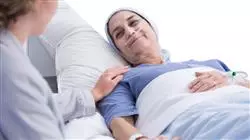University certificate
The world's largest faculty of medicine”
Introduction to the Program
Don't miss the opportunity to become in a talented and up-to-date Psycho-Oncology based on the new criteria of this Hybrid professional master’s degree"

Medical specialties, including Psycho-Oncology, have experienced continuous evolution in recent years. Specifically, this health branch has innovated in the development of novel care protocols such as the development of therapies
collective, cognitive and behavioral help methodologies, among many other strategies. This scientific dynamism has made this medical specialty one of the most innovative in recent times.
For this reason, TECH has developed a program that combines, with excellence, the theoretical subjects and practical skills essential for this academic sector. This learning model consists of two fundamental phases. The first of them addresses, in an interactive and 100% online study platform, the most innovative content in this area. To study all these aspects, the specialist will have innovative educational methods such as Relearning and will rely on materials of great educational value such as videos, infographics and interactive summaries. For 1,500 hours, you will not have to worry about pre-established evaluative schedules or schedules.
Likewise, the degree has foreseen a face-to-face and intensive stay of 3 weeks duration, in a medical facility of international prestige. From that environment practical, the professional will know first-hand the work dynamics of a specialist in Psycho-Oncology, providing direct care to real patients, analyzing technical data on their evolution and debating innovative treatments with professionals with extensive experience. A magnificent opportunity to incorporate the most recent advances in this academic field into daily work practice, with both a theoretical and health care clinical perspective.
You will have access to multiple theoretical contents, updated according to international trends, throughout this innovative Hybrid professional master’s degree”
This Hybrid professional master’s degree in Psycho-Oncology contains the most complete and updated scientific program on the market. Its most notable features are:
- Development of more than 100 clinical cases presented by professionals of Psycho-oncology, experts in the management of patients with aggravated states of tumor disease
- The graphic, schematic, and practical contents with which they are created, provide scientific and practical information on the disciplines that are essential for professional practice
- Comprehensive systematized action plans for the main pathologies in the operating room
- Presentation of practical workshops on procedures diagnosis, and treatment techniques
- Interactive learning system based on algorithms for decision making about the clinical situations raised
- Practical clinical guides on approaching different pathologies
- All this will be complemented by theoretical lessons, questions to the expert, debate forums on controversial topics, and individual reflection assignments
- Content that is accessible from any fixed or portable device with an Internet connection
- In addition, you will be able to do a clinical internship in one of the best hospital centers
Thanks to TECH, you will have 3 weeks of direct training in one of the best clinical centers, which will mean complete immersion in the reality of Psycho-Oncologic intervention"
In this Master's proposal, of a professional nature and blended modality, the program is aimed at updating Psycho-Oncology professionals, who require a high level of qualification. The contents are based on the latest scientific evidence, and oriented in a educational way to integrate theoretical knowledge in the medical practice, and the theoretical-practical elements will facilitate the updating of knowledge and allow decision-making in patient management.
Thanks to their multimedia content prepared with the latest educational technology, they will allow the medical professional to obtain situated and contextual learning, that is, a simulated environment that will provide immersion learning programmed to train in real situations. The design of this program focuses on the Problem-Based Learning, through which you must try to solve the different professional practice situations that arise throughout it. In order to do this, you will have the help of a new interactive video system made by renowned experts.
All the contents of this Hybrid professional master’s degree will be accessible online, without time restrictions or continuous evaluations on an innovative study platform that TECH provides"

Enroll in this degree and catch up your skills in Psycho-Oncology through the most intensive practical and in-person stay on the educational market"
Why study at TECH?
TECH is the world’s largest online university. With an impressive catalog of more than 14,000 university programs available in 11 languages, it is positioned as a leader in employability, with a 99% job placement rate. In addition, it relies on an enormous faculty of more than 6,000 professors of the highest international renown.

Study at the world's largest online university and guarantee your professional success. The future starts at TECH”
The world’s best online university according to FORBES
The prestigious Forbes magazine, specialized in business and finance, has highlighted TECH as “the world's best online university” This is what they have recently stated in an article in their digital edition in which they echo the success story of this institution, “thanks to the academic offer it provides, the selection of its teaching staff, and an innovative learning method aimed at educating the professionals of the future”
A revolutionary study method, a cutting-edge faculty and a practical focus: the key to TECH's success.
The most complete study plans on the university scene
TECH offers the most complete study plans on the university scene, with syllabuses that cover fundamental concepts and, at the same time, the main scientific advances in their specific scientific areas. In addition, these programs are continuously being updated to guarantee students the academic vanguard and the most in-demand professional skills. In this way, the university's qualifications provide its graduates with a significant advantage to propel their careers to success.
TECH offers the most comprehensive and intensive study plans on the current university scene.
A world-class teaching staff
TECH's teaching staff is made up of more than 6,000 professors with the highest international recognition. Professors, researchers and top executives of multinational companies, including Isaiah Covington, performance coach of the Boston Celtics; Magda Romanska, principal investigator at Harvard MetaLAB; Ignacio Wistumba, chairman of the department of translational molecular pathology at MD Anderson Cancer Center; and D.W. Pine, creative director of TIME magazine, among others.
Internationally renowned experts, specialized in different branches of Health, Technology, Communication and Business, form part of the TECH faculty.
A unique learning method
TECH is the first university to use Relearning in all its programs. It is the best online learning methodology, accredited with international teaching quality certifications, provided by prestigious educational agencies. In addition, this disruptive educational model is complemented with the “Case Method”, thereby setting up a unique online teaching strategy. Innovative teaching resources are also implemented, including detailed videos, infographics and interactive summaries.
TECH combines Relearning and the Case Method in all its university programs to guarantee excellent theoretical and practical learning, studying whenever and wherever you want.
The world's largest online university
TECH is the world’s largest online university. We are the largest educational institution, with the best and widest online educational catalog, one hundred percent online and covering the vast majority of areas of knowledge. We offer a large selection of our own degrees and accredited online undergraduate and postgraduate degrees. In total, more than 14,000 university degrees, in eleven different languages, make us the largest educational largest in the world.
TECH has the world's most extensive catalog of academic and official programs, available in more than 11 languages.
Google Premier Partner
The American technology giant has awarded TECH the Google Google Premier Partner badge. This award, which is only available to 3% of the world's companies, highlights the efficient, flexible and tailored experience that this university provides to students. The recognition as a Google Premier Partner not only accredits the maximum rigor, performance and investment in TECH's digital infrastructures, but also places this university as one of the world's leading technology companies.
Google has positioned TECH in the top 3% of the world's most important technology companies by awarding it its Google Premier Partner badge.
The official online university of the NBA
TECH is the official online university of the NBA. Thanks to our agreement with the biggest league in basketball, we offer our students exclusive university programs, as well as a wide variety of educational resources focused on the business of the league and other areas of the sports industry. Each program is made up of a uniquely designed syllabus and features exceptional guest hosts: professionals with a distinguished sports background who will offer their expertise on the most relevant topics.
TECH has been selected by the NBA, the world's top basketball league, as its official online university.
The top-rated university by its students
Students have positioned TECH as the world's top-rated university on the main review websites, with a highest rating of 4.9 out of 5, obtained from more than 1,000 reviews. These results consolidate TECH as the benchmark university institution at an international level, reflecting the excellence and positive impact of its educational model.” reflecting the excellence and positive impact of its educational model.”
TECH is the world’s top-rated university by its students.
Leaders in employability
TECH has managed to become the leading university in employability. 99% of its students obtain jobs in the academic field they have studied, within one year of completing any of the university's programs. A similar number achieve immediate career enhancement. All this thanks to a study methodology that bases its effectiveness on the acquisition of practical skills, which are absolutely necessary for professional development.
99% of TECH graduates find a job within a year of completing their studies.
Hybrid Professional Master's Degree in Psycho-Oncology
The emotional and psychological impact of cancer is a reality that cannot be overlooked. It is one of the most common situations in patients with any clinical oncological condition. TECH Global University is aware of the difficulties of patients and presents you with the Hybrid Professional Master's Degree in Psycho-Oncology to advance your professional career and thus be able to handle in an inclusive way all the emotional difficulties of affected patients and their families. Our academic program combines a solid online theoretical training with face-to-face practices in clinics and specialized centers. Through our virtual platform, you will have access to interactive learning resources, live lectures and updated materials that will allow you to acquire the necessary knowledge to understand the interaction between the oncological disease and the emotional and psychological aspects. In TECH Global University's Hybrid Professional Master's Degree in Psycho-Oncology, you will specialize in the therapeutic approach to the emotional aspects related to cancer. You will learn assessment, intervention and psychological support techniques adapted to the needs of patients, both individually and in the family context.
Learn about how to help families at critical moments
Our program also focuses on the importance of effective communication and empathy in dealing with patients and their loved ones. You will learn strategies to facilitate the expression of emotions, stress management and decision making in difficult situations. TECH Global University's Hybrid Professional Master's Degree in Psycho-Oncology will give you the opportunity to develop practical skills through face-to-face internships at referral centers. You will work directly with oncology patients and will be guided by experienced professionals in the field of psycho-oncology. If you are looking for a rewarding career where you can make a difference in people's lives, our Hybrid Professional Master's Degree in Psycho-Oncology is the perfect choice. Enroll now and begin your path to a unique specialization at TECH Global University!







